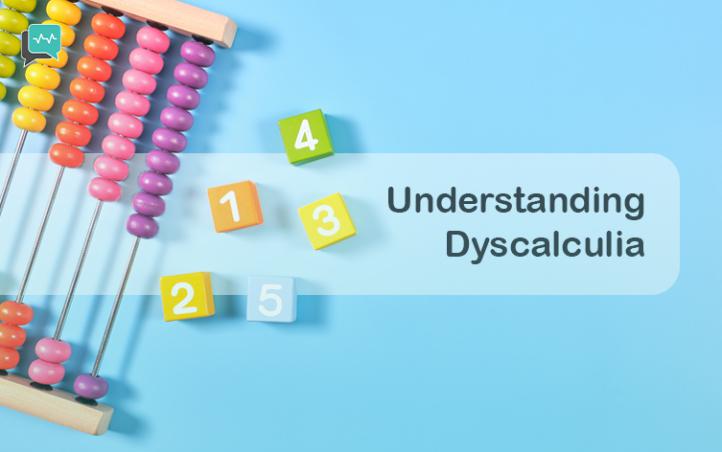Understanding Dyscalculia

What is dyscalculia?

Dyscalculia is an inability to understand some or all of the most basic building blocks of mathematical calculations or equations. People with dyscalculia aren’t just afraid of or “bad” at math, or lazy. They may be very intelligent, however; their brains are unable to make sense out of mathematical concepts. Dyscalculia can affect many different aspects of everyday life, including the ability to read clocks or manage personal finances.
Dyscalculia can be either developmental or acquired later in life. Dyscalculia acquired later in life is usually the result of a stroke or injury to the brain. It may also be called ‘acalculia’.
Dyscalculia is believed to affect at least 1-2% of the global population. Using a broader definition, which might include people with disorders that have a similar impact on math ability, the prevalence might be as high as 7%.
What are the symptoms of dyscalculia?

There is a wide range of symptoms and severity of dyscalculia. The more common ones include:
- Difficulty understanding quantity. A person sees a stack of ten quarters but can’t identify it as one stack of ten quarters.
- Difficulty understanding comparisons such as bigger vs. smaller, or many vs. few.
- Difficulty reading, writing or understanding mathematical symbols such as +, -, %, or x.
- Difficulty linking a number to a quantity. A child takes two pieces of candy although she is told to take five pieces.
- An inability to understand the place value system of numbers in which ones, tens, hundreds, etc. are always in the same place. Someone with this difficulty might not understand why 75 is not as much as 134, since 7 and 5 are both bigger than 1, 3, and 4.
- Difficulty counting backward.
- Difficulty translating a verbal sentence into a mathematical equation. A classic example is the question of what time two trains traveling in opposite directions at different speeds will pass each other.
The symptoms of dyscalculia depend on the individual, but many people with dyscalculia struggle with daily life, jobs, education, and managing money and finances. They might be less likely to work in fields that require some mathematical aptitude, such as finance, scientific research, health care, or engineering, and might not be able to keep jobs such as cashier, construction worker, or designer.
What causes developmental dyscalculia?

Researchers don’t know exactly what causes developmental dyscalculia. Theories include:
- Neurological disorders.
However, much of the research into neurological causes of dyscalculia have been done with children who are already known to have certain neurologic deficits. For many people with dyscalculia, there is no ‘ready-made’ explanation.
- Genetic factors.
Currently, there are no tests that will determine if an individual’s dyscalculia is genetically inherited from a parent.
- Environmental factors.
One example would be a teacher who has pupils memorize mathematical rules without being sure that the pupils understand the underlying principles. In some children taught this way, the neural pathways needed to understand higher mathematical concepts might fail to develop.
- Illness or injury after birth affecting the brain.
Dyscalculia often occurs with other disorders such as dyslexia and ADHD. Researchers estimate that 70%-80% of children who have dyscalculia also have dyslexia. It seems likely that the links between the two conditions include differences in how the brain processes information and handles ‘executive functions’ such as sequencing and working memory.
It is completely possible to have these learning disorders yet still have average or better intelligence or competence in other areas.
What are the symptoms of acquired dyscalculia?
The symptoms of acquired dyscalculia are similar to the symptoms of developmental dyscalculia, however, acquired dyscalculia is a result of damage to the brain from a stroke or trauma. Prior to the stroke or trauma, the person might have had normal mathematical comprehension. During the healing process, acquired dyscalculia typically improves as language skills are recovered.
How is dyscalculia diagnosed?

Dyscalculia is usually diagnosed by a psychologist with specific expertise in cognitive processes and development. They will ask about the child’s medical history to rule out the possibility of a medical cause of the problem. They may observe the child in a ‘normal’ setting such as school, and they might give the child some tests that are disguised as games or puzzles.
The process is similar for adults, but testing might be done on-line and observation might be at work instead of at school.
It is important to investigate why a person is having difficulty with math. For example, it might turn out that the child is easily able to understand math once she is moved into a quieter bedroom and gets more sleep. That child might simply need some remedial math education.

Other conditions that can cause difficulties with math include:
- Fetal alcohol syndrome.
- Cognitive impairment.
- Learning math in one’s second language.
- Poor vision or hearing.
- Side effects of medication.
- Medical conditions that cause ‘brain fog’.
- Lead poisoning.
Not all difficulties with math are dyscalculic. Some children have difficulty focusing their attention long enough to learn. Other children might have dyslexia and be unable to translate a written problem into a numerical one. Still others might have heard a parent say that ‘I can’t do math’ and decided that they can’t do math either. Teasing out what is dyscalculia — and what is not — is usually a job best left to the psychologists.
How can a person function in everyday life with dyscalculia?

There are a wide range of supports for people with dyscalculia. Ideally, diagnosis is made when children are young so that they can receive specialized help in developing math skills. This help can range from worksheets to specially designed computer games and from worksheets to private tutoring or in-school support from learning specialists.
Even early diagnosis is not a cure-all, however, and people with dyscalculia will usually always require some support. Strategies include:
- Using a calculator.
- Using smartphone apps.
- Talking through math problems, or drawing them.
- Using everyday objects to physically solve math problems, whether at school or in everyday life.
- Receiving special accommodations, either at work or at school.
- Using adaptive equipment, such as a tape measure that ‘speaks’, or measuring cups with graphic designs instead of fractions.
- Keeping charts of needed information handy, in a format that makes sense to the user.

Research into dyscalculia is many years behind research into similar conditions such as dyslexia. There have been very few high-quality studies to guide us in preventing, treating, or managing dyscalculia. Even something as seemingly simple as the definition of dyscalculia varies enough that we only know that roughly between 1% and 7% of people have the condition.
If you believe that you or your child has dyscalculia, find a psychologist with experience in learning disorders. Be willing to put in the extra work needed – either to find resources that can help your child, or to find resources that you can use to help yourself.
How can Halza help?
Manage your health easily with the Halza app. Store, track & share all of your medical records to have them with you, wherever you go. Monitor your symptoms as well as upload reports and doctor’s notes all with the Halza app. QuickShare a complete overview of your health with any attending doctor in seconds, during emergencies or whenever you need.
Simplify your health journey with Halza.